You can keep your teeth healthy in surprising ways beyond just brushing. Enjoying crunchy carrots acts like an automatic toothbrush, helping remove plaque. Try snacking on cheese to boost your enamel and stimulate saliva. Incorporating yogurt can strengthen enamel thanks to its calcium content, while onions fight harmful bacteria. Chewing sugar-free gum stimulates saliva, washing away acids and food particles. Don't forget about apples, which freshen your breath, and strawberries, known for whitening teeth. Even including salmon in your diet can enhance calcium absorption for stronger teeth. There's more to explore, so keep going to discover additional tips!
Key Takeaways
- Incorporate salmon into your diet for its Vitamin D and calcium, which enhance enamel strength and support overall dental health.
- Chew sugar-free gum after meals to stimulate saliva production, neutralizing acids and reducing plaque buildup.
- Snack on crunchy vegetables like carrots and celery, which naturally scrub teeth and promote saliva flow for better oral hygiene.
- Enjoy cheese as it balances mouth pH and stimulates saliva, helping wash away harmful acids and food particles.
Chewing Gum Benefits

Chewing sugar-free gum can be a simple yet effective way to boost your oral health after meals. When you chew gum, it stimulates saliva production, which plays an essential role in rinsing away harmful acids and food particles from your teeth. Increased saliva helps neutralize acids that can lead to plaque buildup and tooth decay.
Moreover, if you choose xylitol-sweetened gum, you're taking an extra step toward better oral hygiene. Xylitol inhibits the growth of cavity-causing bacteria, making it a great ally in your fight against cavities. Chewing gum can also enhance breath freshness, so it's a convenient option for maintaining oral health on the go.
For maximum benefits, it's recommended to chew two pieces of sugar-free gum for about 20 minutes after meals. This practice not only aids in reducing plaque buildup but also serves as a temporary alternative to brushing when you don't have a toothbrush handy.
Nutritional Power of Salmon
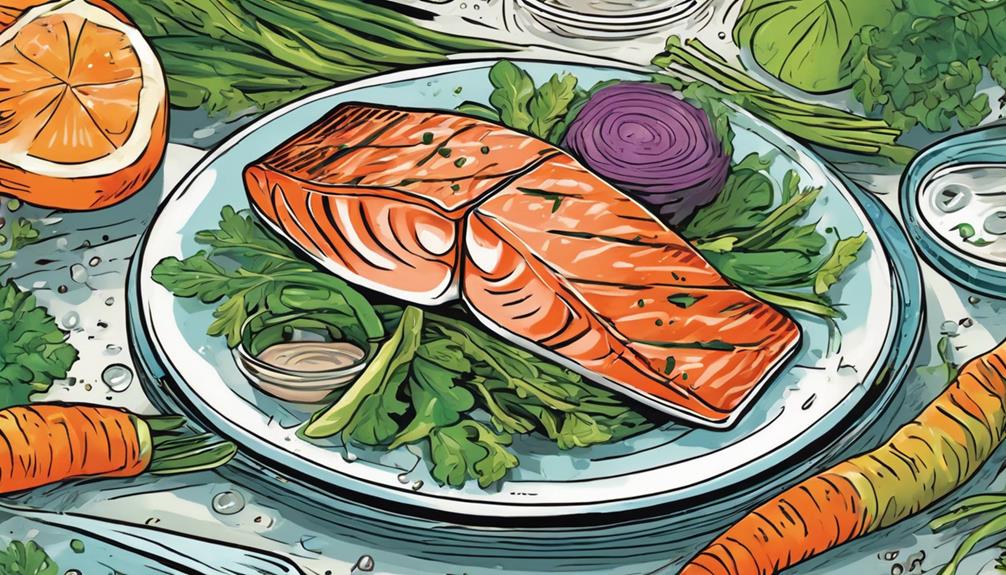
Salmon packs a nutritional punch that's great for your teeth.
With its high Vitamin D and calcium content, it boosts calcium absorption and supports bone health.
Vitamin D Benefits
Incorporating salmon into your diet not only boosts your Vitamin D levels but also greatly enhances your teeth and gum health. This nutrient is crucial for maintaining strong enamel, which protects against tooth decay, and plays a key role in preventing gum disease. When you consume salmon regularly, you support your oral health considerably by confirming your body has adequate Vitamin D for ideal calcium absorption.
Here are some important benefits of Vitamin D from salmon:
- Strengthens enamel: Helps mineralize teeth, reducing the risk of cavities.
- Supports gum health: Lowers the chances of developing gum disease.
- Enhances calcium absorption: Confirms your body utilizes calcium efficiently for strong teeth.
- Promotes healthy bones: Contributes to overall bone health, supporting the stability of your teeth in the jaw.
Calcium Absorption Boost
Boosting your calcium absorption is made easier with the nutritional power of salmon, which is packed with Vitamin D and other key nutrients that support dental health.
Vitamin D plays an essential role in enhancing calcium absorption, making it critical for maintaining strong teeth and gums. When you include salmon in your diet, you're not just enjoying a delicious meal; you're also promoting your oral health.
The high calcium content in salmon contributes greatly to dental well-being. By regularly consuming this fish, you strengthen your teeth and gums, ensuring they remain healthy and resilient. Plus, salmon helps prevent deficiencies that can impair your body's ability to absorb calcium effectively.
Incorporating salmon into your meals can be a game-changer for your dental health routine. Whether it's grilled, baked, or added to salads, the nutritional benefits are undeniable.
Bone Health Support
The nutritional benefits of salmon greatly enhance bone health, making it an essential part of your diet for strong teeth and a sturdy jaw.
Rich in Vitamin D, salmon boosts calcium absorption, which directly supports both your bone and oral health. By strengthening your jawbone, you help maintain the structure essential for holding your teeth securely.
Consider these benefits of including salmon in your diet:
- Enhances calcium absorption: Vitamin D helps your body utilize calcium more effectively.
- Strengthens teeth and gums: The calcium content contributes to better oral health.
- Supports jawbone stability: A healthy jawbone is key for preventing tooth loss.
- Reduces risk of periodontal disease: Stronger bones help prevent gum-related issues.
Incorporating salmon into your meals not only bolsters your bone health but also promotes your overall dental integrity.
Carrots as Natural Toothbrush
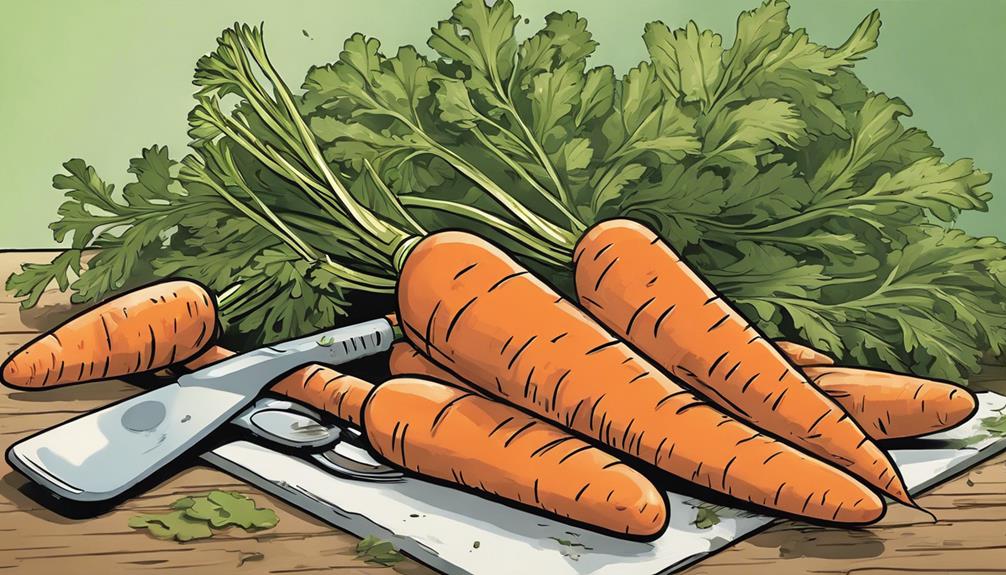
Did you know that munching on crunchy carrots can benefit your teeth? Their texture helps scrub away plaque while also stimulating saliva production, making them a natural plaque fighter.
Plus, with their high Vitamin A content, carrots contribute to maintaining strong tooth enamel and overall dental health.
Crunchy Texture Benefits
Chewing carrots acts like a natural toothbrush, effectively scrubbing away plaque and food particles while promoting oral health. Their crunchy texture helps you maintain oral hygiene by stimulating saliva production, which neutralizes harmful acids in your mouth. Plus, carrots are packed with keratin, a nutrient that combats plaque buildup, keeping your teeth cleaner.
Incorporating crunchy fruits and vegetables, like carrots, into your diet has numerous benefits:
- Helps scrub teeth: The crunchiness acts like a gentle abrasive, removing debris.
- Boosts saliva flow: Saliva is essential for neutralizing acids and protecting enamel.
- Rich in Vitamin A: This vitamin supports enamel strength and overall dental health.
- Encourages healthy snacking: Opting for carrots helps you avoid sugary snacks that contribute to cavities.
Natural Plaque Fighter
Carrots serve as a natural toothbrush, effectively scrubbing away plaque and promoting healthier teeth with each crunchy bite. Their crispy texture acts like a natural plaque fighter, helping to remove food particles and bacteria that cling to your teeth.
As you munch on these crunchy fruits, you stimulate saliva production, which plays a crucial role in maintaining oral health. Saliva not only neutralizes harmful bacteria and acids but also washes away debris, contributing to better dental hygiene.
In addition to their mechanical cleaning properties, carrots are high in keratin, which can help combat plaque buildup. This means that incorporating carrots into your diet can have a significant impact on your oral health.
They're low in calories and packed with nutrients, making them an ideal snack choice.
Vitamin A Contribution
Packed with Vitamin A, carrots play an essential role in strengthening enamel and promoting overall oral health. By incorporating these crunchy fruits into your diet, you're not just enjoying a tasty snack; you're also giving your teeth a natural cleaning boost.
The crunchy texture helps scrub away plaque buildup and food particles, while chewing stimulates saliva production. This saliva is vital for neutralizing harmful bacteria and acids that can lead to cavities.
Here are some benefits of eating carrots for your dental health:
- Strengthens tooth enamel due to high vitamin A content.
- Acts as a natural toothbrush, effectively cleaning teeth as you chew.
- Promotes gum health by reducing plaque and inflammation.
- Stimulates saliva production, which helps wash away harmful substances.
Cheese for Stronger Teeth
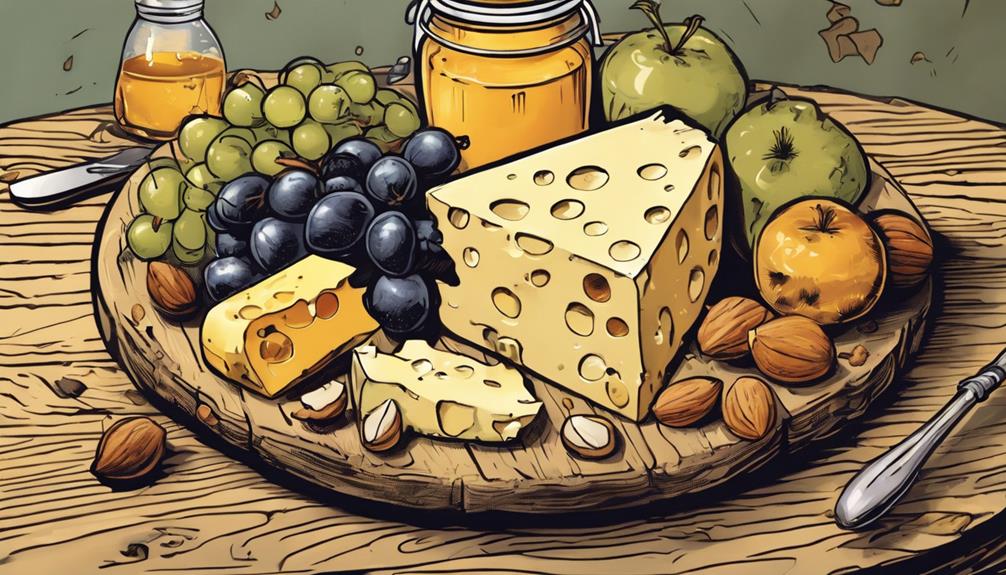
Including cheese in your diet can greatly boost your dental health by providing essential nutrients that strengthen tooth enamel. Cheese is rich in phosphate and calcium, which are important for maintaining strong teeth.
When you enjoy cheese, it helps promote overall dental health by balancing pH levels in your mouth, effectively reducing harmful acids that can lead to tooth decay.
Additionally, the act of chewing cheese stimulates saliva production, which plays a significant role in neutralizing acids and washing away food particles. This natural defense mechanism not only protects your teeth but also contributes to a cleaner mouth overall.
Several studies suggest that incorporating cheese into your daily routine may lower the risk of cavities, thanks to its protective effects on your teeth.
Yoghurt and Tooth Enamel

When it comes to protecting your tooth enamel, yoghurt can be a game changer.
The casein in yoghurt strengthens enamel, while its calcium content aids in repair.
Casein Strengthens Enamel
Casein, a protein in yoghurt, forms a protective layer on your teeth that boosts enamel strength and resistance to decay. This means that by incorporating casein-rich foods into your diet, you're not just enjoying a tasty snack; you're actively supporting your oral health.
Yoghurt is an excellent source of calcium, essential for maintaining strong tooth enamel and preventing tooth decay. Plus, the probiotics found in yoghurt help balance your oral microbiome, reducing harmful bacteria that can lead to cavities.
Here are some benefits of including casein in your diet:
- Strengthens tooth enamel, making it more resistant to acids.
- Provides essential calcium for enamel repair and overall dental health.
- Supports a healthy oral microbiome to combat tooth decay.
- Reduces the risk of cavities when consumed regularly.
Calcium Aids Repair
Calcium plays an essential role in repairing and strengthening tooth enamel, making yoghurt a valuable addition to your diet for maintaining dental health. With its high calcium content, yoghurt helps reinforce your enamel and protect against decay. The casein protein found in yoghurt not only contributes to this process but also aids in remineralizing your teeth, keeping them strong and healthy.
Incorporating unsweetened natural yoghurt into your daily routine enhances calcium absorption, further benefiting your tooth health. By regularly enjoying this delicious snack, you can support your gums as well, reducing the risk of cavities and other dental issues.
Additionally, yoghurt is packed with probiotics, which promote gut health. A healthy gut can lead to reduced inflammation in your body, indirectly improving your oral health.
As you focus on maintaining a balanced diet, remember that yoghurt can play a vital role in your quest for ideal dental hygiene.
Sesame Seeds for Plaque Control
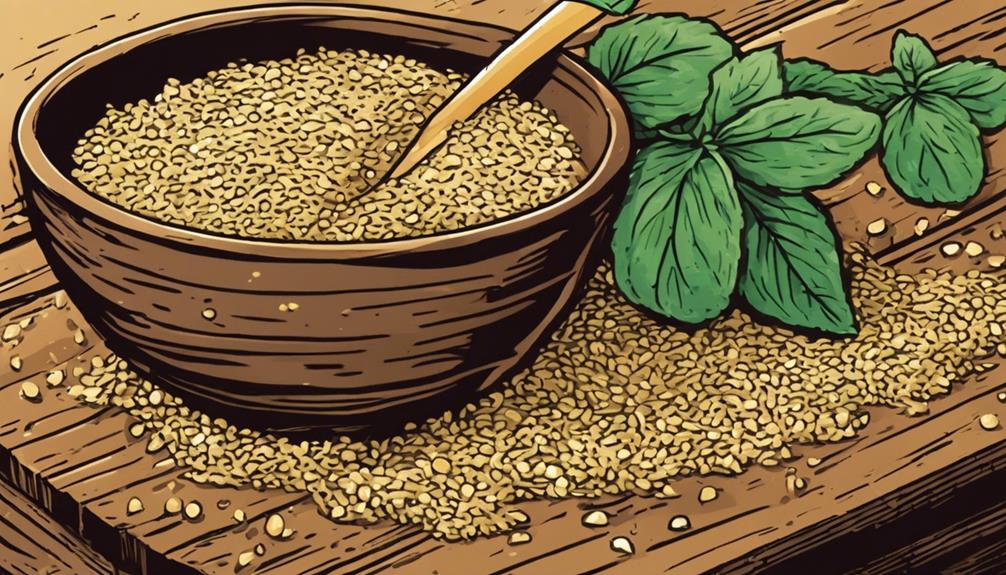
Chewing sesame seeds not only scrubs plaque from your teeth but also boosts your calcium intake, promoting better oral health. These tiny powerhouses act as a natural abrasive, helping you maintain excellent oral hygiene. By incorporating sesame seeds into your diet, you can actively support your dental health and reduce the risk of cavities.
Here are some benefits of including sesame seeds in your routine:
- Plaque control: Their abrasive texture helps dislodge plaque, keeping your teeth cleaner.
- Calcium intake: Sesame seeds are rich in calcium, essential for strong teeth and bones.
- Cavity prevention: Regular consumption can lower the risk of cavities by reducing plaque buildup.
- Nutritional boost: They provide essential vitamins and minerals beneficial for overall health.
Remember to promptly remove any sesame seeds that get stuck between your teeth.
Onions for Oral Health

Incorporating raw onions into your diet can considerably boost your oral health by combating harmful bacteria that cause gum disease. The sulfur compounds in onions possess antibacterial properties, effectively targeting the bacteria linked to periodontitis and other oral issues. By including onions in your meals, you can help reduce the risk of gum disease while promoting healthy teeth.
Chewing raw onions stimulates saliva production, which plays an essential role in maintaining oral hygiene. Saliva helps neutralize acids and rinse away food particles, making it easier to keep your mouth clean. You might notice that the strong flavor of onions lingers, so chewing sugar-free gum afterward can freshen your breath without compromising your oral health benefits.
Onions are versatile and can easily be added to salads, sandwiches, or cooked dishes, providing an enjoyable way to improve your oral hygiene routine. Just remember to balance your onion intake with other healthy foods to maintain overall health. Embrace this flavorful addition to your diet, and you'll be on your way to healthier teeth and gums!
Celery's Cleaning Properties

Celery acts as a natural toothbrush, scrubbing your teeth and gums while you enjoy this crunchy, hydrating snack.
Its fibrous texture isn't just satisfying; it promotes good oral health by helping to remove food particles that can lead to plaque buildup.
When you chew celery, it stimulates saliva production, which plays an essential role in oral hygiene. Saliva helps neutralize bacteria and wash away debris, reducing your risk of gum disease.
Incorporating celery into your diet not only makes snacking enjoyable but also offers several health benefits:
- Strengthens gums by promoting blood circulation
- Helps remove food particles from your teeth
- Provides hydration due to its high water content
- Low in calories, making it a guilt-free snack
Apples for Fresh Breath
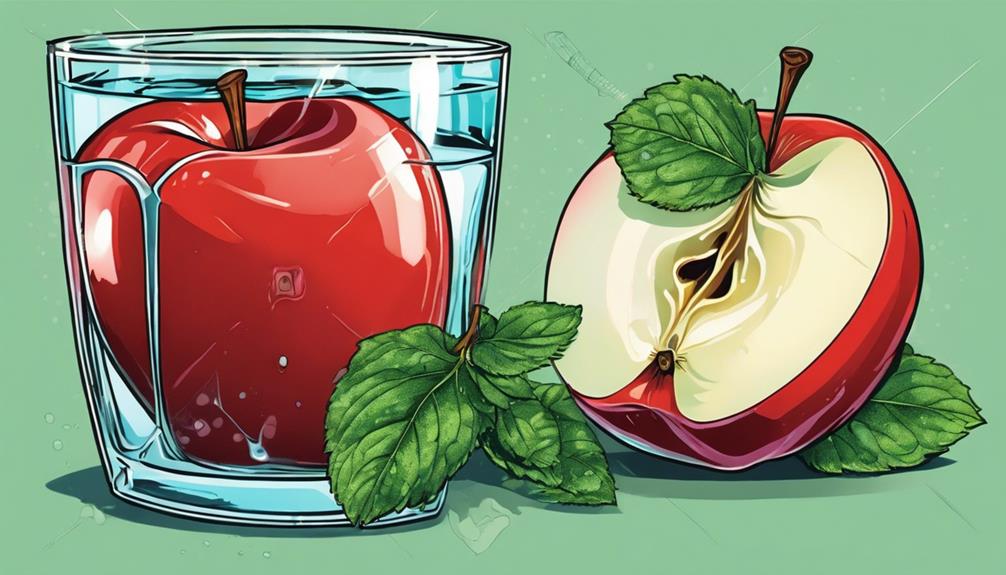
Eating an apple not only satisfies your hunger but also helps keep your breath clean and your mouth healthy.
Apples contain natural sugars that neutralize harmful mouth acids, contributing to better oral health. Their crunchy texture acts like a natural toothbrush, promoting saliva production that rinses away food particles and bacteria. When you're chewing an apple, you're stimulating saliva flow, which is essential for washing away debris and maintaining a balanced pH in your mouth.
In addition to their invigorating qualities, apples are packed with vitamins that support gum health. Healthy gums play an important role in overall mouth cleanliness and freshness, making apples an excellent choice for a snack. Plus, their acidic nature doesn't weaken tooth enamel, so you can enjoy them guilt-free.
Incorporating apples into your diet can be a delicious way to enhance your oral hygiene routine. The combination of their natural cleaning properties and health benefits makes them a fantastic option for anyone looking to boost their fresh breath and maintain good oral health.
Strawberries as Enamel Whitener
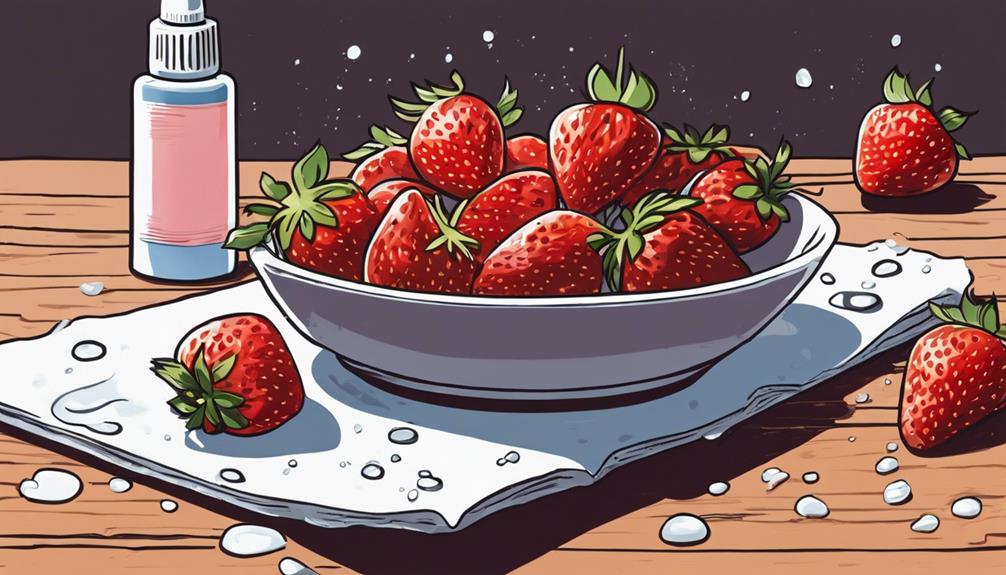
Strawberries can naturally brighten your smile thanks to their malic acid, which helps remove surface stains from your teeth. This delicious fruit acts as a natural enamel whitener, making it perfect for enhancing your oral health. Plus, the sweetness of strawberries can neutralize harmful mouth acids without harming your tooth enamel.
Incorporating strawberries into your diet brings additional benefits:
- Promotes saliva production: Helps rinse away food particles and bacteria.
- Rich in vitamin C: Essential for maintaining healthy gums and reducing the risk of gum disease.
- Supports overall oral health: Regular consumption can keep your mouth in top shape.
- Natural sweetness: A healthy alternative to sugary snacks that can harm your teeth.
Frequently Asked Questions
What Are 10 Things to Keep Your Teeth Healthy?
To keep your teeth healthy, brush twice daily, floss regularly, eat calcium-rich foods, chew sugar-free gum, enjoy crunchy fruits and veggies, drink unsweetened tea, limit sugary snacks, stay hydrated, and visit your dentist regularly. Some other ways to maintain good oral health include avoiding tobacco products, limiting acidic and sugary drinks, and using a fluoride toothpaste. Additionally, many people may not realize the surprising benefits of chewing gum. Chewing sugar-free gum can actually help to increase saliva production and wash away food particles and bacteria. This can help to reduce the risk of tooth decay and improve overall oral health. Therefore, incorporating sugar-free gum into your daily routine can be a simple yet effective way to protect your teeth.
How to Keep Teeth Healthy Naturally?
You'd think brushing's enough, but keeping your teeth healthy naturally means munching on crunchy fruits, sipping water, and enjoying calcium-rich snacks. It's amazing how simple habits can make a huge difference in your oral health!
How to Quickly Improve Dental Health?
To quickly improve your dental health, chew sugar-free gum, eat crunchy fruits, and incorporate calcium-rich foods. Don't forget to floss daily and drink unsweetened tea to combat plaque and strengthen your teeth.
Is It Possible to Make Your Teeth Healthy Again?
Yes, you can make your teeth healthy again! By eating calcium-rich foods, crunching fruits and veggies, chewing sugar-free gum, and practicing good oral hygiene, you'll strengthen enamel and promote healing effectively. Regular check-ups help too!
How Does Chewing Sugar-Free Gum Keep Your Teeth Healthy?
Chewing sugar-free gum can help keep your teeth healthy by increasing saliva production, which helps to wash away food particles and neutralize acids. Some of the top sugarfree gums for healthy teeth include brands like Trident, Orbit, and Extra, which are sweetened with xylitol instead of sugar.
Conclusion
Your smile is like a garden, and each of these unexpected methods nurtures its growth.
Just as vibrant flowers need the right care, your teeth thrive on the benefits of chewing gum, nutrient-rich salmon, and crunchy carrots.
Embrace the magic of cheese, yogurt, and onions to keep your oral health blooming.
With every apple and strawberry, you're not just freshening breath but painting your canvas of confidence.
Cultivate these habits, and watch your radiant smile flourish!









